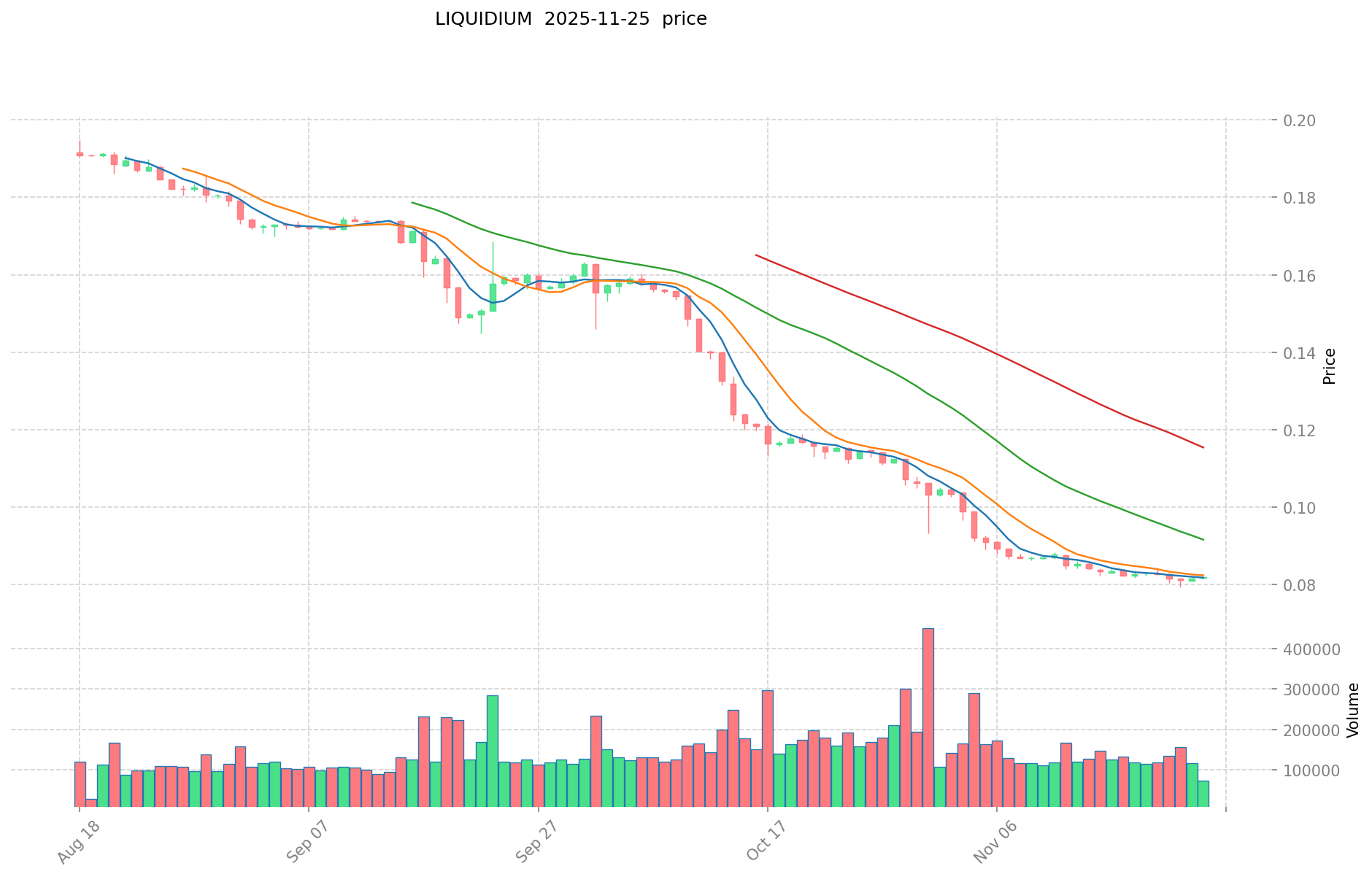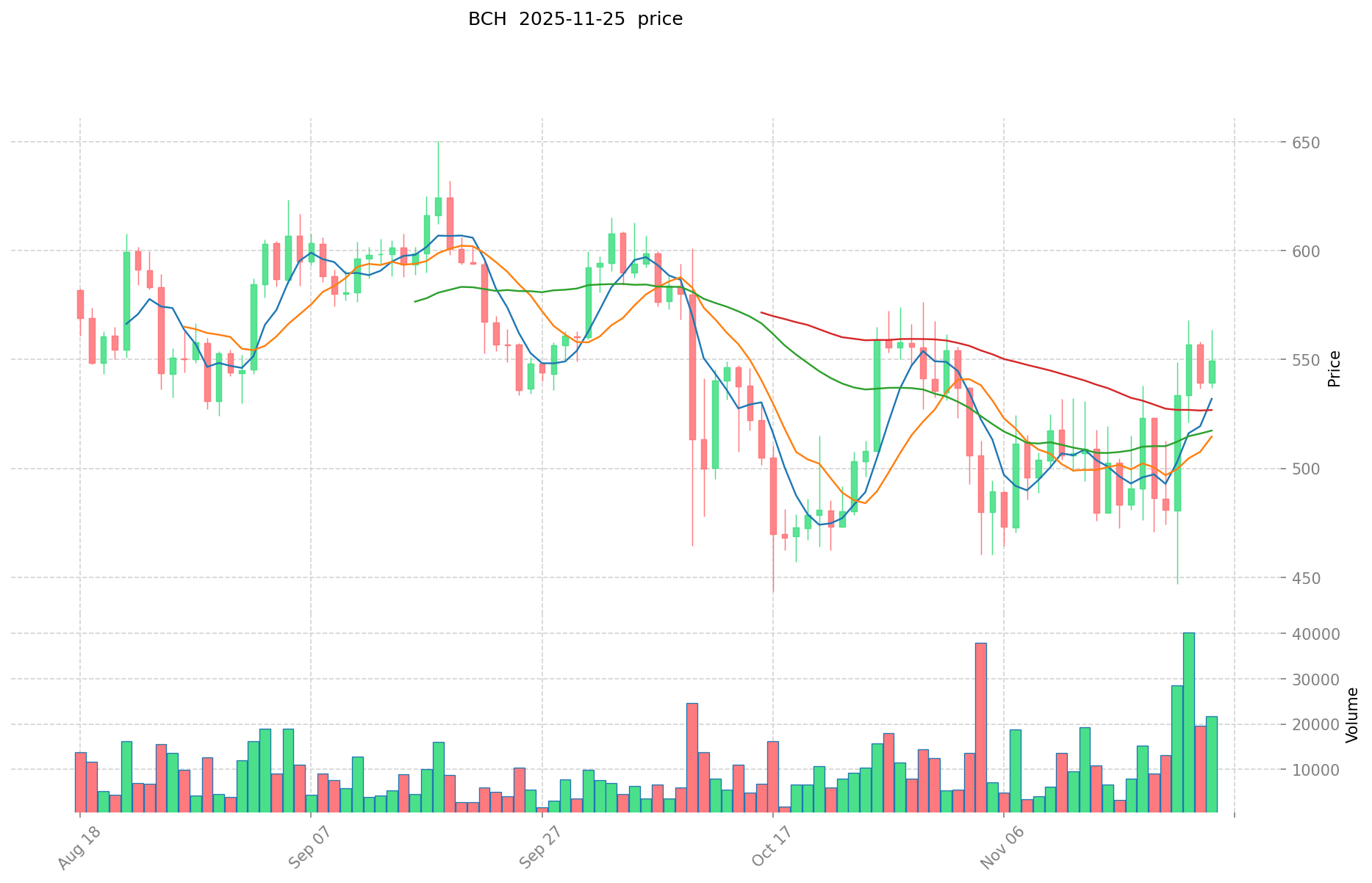LIQUIDIUM vs BCH: The Battle for Faster and More Efficient Cryptocurrency Transactions
Introduction: LIQUIDIUM vs BCH Investment Comparison
In the cryptocurrency market, LIQUIDIUM vs BCH comparison has always been a topic investors can't ignore. The two not only have significant differences in market cap ranking, application scenarios, and price performance, but also represent different cryptocurrency positioning.
LIQUIDIUM (LIQUIDIUM): Since its launch in 2024, it has gained market recognition for its non-custodial lending protocol on Bitcoin.
BCH (BCH): Since its inception in 2017, it has been hailed as a "global payment system," and is one of the cryptocurrencies with the highest global trading volume and market capitalization.
This article will comprehensively analyze the investment value comparison between LIQUIDIUM and BCH, focusing on historical price trends, supply mechanisms, institutional adoption, technological ecosystems, and future predictions, and attempt to answer the question investors care about most:
"Which is the better buy right now?"
I. Price History Comparison and Current Market Status
LIQUIDIUM (Coin A) and BCH (Coin B) Historical Price Trends
- 2024: LIQUIDIUM reached its all-time high of $1.6263 on July 22, 2024.
- 2017: BCH peaked at $3,785.82 on December 20, 2017, following its creation through a Bitcoin hard fork.
- Comparative analysis: In recent market cycles, LIQUIDIUM dropped from its peak of $1.6263 to a low of $0.05, while BCH declined from its all-time high of $3,785.82 to a low of $76.93 in December 2018.
Current Market Situation (2025-11-26)
- LIQUIDIUM current price: $0.08261
- BCH current price: $521.36
- 24-hour trading volume: LIQUIDIUM $2,301,348.64 vs BCH $7,886,783.62
- Market Sentiment Index (Fear & Greed Index): 20 (Extreme Fear)
Click to view real-time prices:
- View LIQUIDIUM current price Market Price
- View BCH current price Market Price


Investment Analysis: LIQUIDIUM vs BCH Core Value Factors
I. Key Factors Influencing LIQUIDIUM and BCH Investment Value
Protocol Innovation and Technology
- LIQUIDIUM: Bitcoin inscription staking protocol providing liquidity for Ordinals and Runes, creating a native liquidity staking framework
- BCH: Defends traditional Bitcoin principles while maintaining network security through community support
- 📌 Innovation Impact: LIQUIDIUM's DeFi innovations target specialized Bitcoin use cases, while BCH focuses on maintaining established blockchain fundamentals
Investment Backing and Funding
- LIQUIDIUM: Secured early investment from Bitcoin Magazine and Bitcoin Frontier Fund; completed $1.25 million pre-seed funding from ACTAI Ventures, Sora Ventures
- BCH: Long-established cryptocurrency with broader market support and traditional investor base
- Institutional Interest: Both projects have attracted significant investment interest, with LIQUIDIUM specifically focusing on Bitcoin inscription ecosystems
Use Case Development
- LIQUIDIUM: Focuses on Ordinal lending protocol on Layer 1, allowing users to borrow against Ordinals and earn Bitcoin interest
- BCH: Positioned as a payment system and store of value with established merchant adoption
- Market Position: LIQUIDIUM targets DeFi innovation specifically within Bitcoin's ecosystem, while BCH maintains broader cryptocurrency use cases
Community and Market Sentiment
- LIQUIDIUM: Building momentum as an innovative Bitcoin-based DeFi protocol with specialized investor appeal
- BCH: Maintains traditional cryptocurrency community support with established market presence
- Future Outlook: LIQUIDIUM presents emerging growth potential in Bitcoin's expanding DeFi landscape, while BCH relies on established network effects and proven security model
III. 2025-2030 Price Prediction: LIQUIDIUM vs BCH
Short-term Prediction (2025)
- LIQUIDIUM: Conservative $0.0545 - $0.0826 | Optimistic $0.0826 - $0.0884
- BCH: Conservative $265.83 - $521.23 | Optimistic $521.23 - $729.72
Mid-term Prediction (2027)
- LIQUIDIUM may enter a growth phase, with an expected price range of $0.0778 - $0.0997
- BCH may enter a consolidation phase, with an expected price range of $629.85 - $722.67
- Key drivers: Institutional capital inflow, ETF, ecosystem development
Long-term Prediction (2030)
- LIQUIDIUM: Base scenario $0.0903 - $0.1129 | Optimistic scenario $0.1129 - $0.1558
- BCH: Base scenario $621.37 - $913.79 | Optimistic scenario $913.79 - $1059.99
Disclaimer: This analysis is for informational purposes only and should not be considered as financial advice. Cryptocurrency markets are highly volatile and unpredictable. Always conduct your own research before making any investment decisions.
LIQUIDIUM:
| 年份 | 预测最高价 | 预测平均价格 | 预测最低价 | 涨跌幅 |
|---|---|---|---|---|
| 2025 | 0.0883927 | 0.08261 | 0.0545226 | 0 |
| 2026 | 0.097471539 | 0.08550135 | 0.0778062285 | 3 |
| 2027 | 0.099720224505 | 0.0914864445 | 0.077763477825 | 10 |
| 2028 | 0.104207634607725 | 0.0956033345025 | 0.090823167777375 | 15 |
| 2029 | 0.125880910539441 | 0.099905484555112 | 0.086917771562947 | 20 |
| 2030 | 0.155792612615242 | 0.112893197547277 | 0.090314558037821 | 36 |
BCH:
| 年份 | 预测最高价 | 预测平均价格 | 预测最低价 | 涨跌幅 |
|---|---|---|---|---|
| 2025 | 729.722 | 521.23 | 265.8273 | 0 |
| 2026 | 700.53312 | 625.476 | 556.67364 | 19 |
| 2027 | 722.6749704 | 663.00456 | 629.854332 | 27 |
| 2028 | 983.832466584 | 692.8397652 | 554.27181216 | 32 |
| 2029 | 989.23661675256 | 838.336115892 | 762.88586546172 | 60 |
| 2030 | 1059.9921849338448 | 913.78636632228 | 621.3747290991504 | 75 |
IV. Investment Strategy Comparison: LIQUIDIUM vs BCH
Long-term vs Short-term Investment Strategies
- LIQUIDIUM: Suitable for investors focused on Bitcoin DeFi innovation and ecosystem potential
- BCH: Suitable for investors seeking established cryptocurrency with payment use cases
Risk Management and Asset Allocation
- Conservative investors: LIQUIDIUM: 10% vs BCH: 90%
- Aggressive investors: LIQUIDIUM: 30% vs BCH: 70%
- Hedging tools: Stablecoin allocation, options, cross-currency portfolio
V. Potential Risk Comparison
Market Risk
- LIQUIDIUM: Higher volatility due to newer protocol and smaller market cap
- BCH: Susceptible to broader cryptocurrency market trends and Bitcoin price movements
Technical Risk
- LIQUIDIUM: Scalability, network stability, smart contract vulnerabilities
- BCH: Mining centralization, potential security vulnerabilities
Regulatory Risk
- Global regulatory policies may impact both differently, with LIQUIDIUM potentially facing scrutiny as a new DeFi protocol
VI. Conclusion: Which Is the Better Buy?
📌 Investment Value Summary:
- LIQUIDIUM advantages: Innovative Bitcoin DeFi protocol, potential for growth in Bitcoin ecosystem
- BCH advantages: Established cryptocurrency, wider adoption for payments, proven track record
✅ Investment Advice:
- New investors: Consider a small allocation to LIQUIDIUM for exposure to Bitcoin DeFi, with a larger position in BCH for stability
- Experienced investors: Balance between LIQUIDIUM and BCH based on risk tolerance and belief in Bitcoin DeFi growth
- Institutional investors: Evaluate LIQUIDIUM for potential high growth, maintain BCH position for cryptocurrency portfolio diversification
⚠️ Risk Warning: The cryptocurrency market is highly volatile. This article does not constitute investment advice. None
VII. FAQ
Q1: What are the main differences between LIQUIDIUM and BCH? A: LIQUIDIUM is a newer Bitcoin-based DeFi protocol focusing on non-custodial lending and staking for Ordinals, while BCH is an established cryptocurrency that forked from Bitcoin in 2017, primarily used as a payment system and store of value.
Q2: Which cryptocurrency has shown better price performance recently? A: As of November 26, 2025, BCH is trading at $521.36, while LIQUIDIUM is at $0.08261. BCH has demonstrated more stable price performance due to its longer market presence, while LIQUIDIUM, being newer, has shown higher volatility.
Q3: What are the key factors influencing the investment value of LIQUIDIUM and BCH? A: Key factors include protocol innovation, investment backing, use case development, and community support. LIQUIDIUM stands out for its Bitcoin DeFi innovations, while BCH benefits from its established market presence and broader adoption.
Q4: How do the long-term price predictions for LIQUIDIUM and BCH compare? A: By 2030, LIQUIDIUM is predicted to reach $0.0903 - $0.1558 in optimistic scenarios, while BCH is expected to range from $621.37 to $1059.99. These predictions suggest potential growth for both, with LIQUIDIUM possibly seeing higher percentage gains from its current lower price point.
Q5: What are the main risks associated with investing in LIQUIDIUM and BCH? A: LIQUIDIUM faces higher volatility and technical risks due to its newer protocol and smaller market cap. BCH is more susceptible to broader cryptocurrency market trends and potential mining centralization issues. Both face regulatory risks, with LIQUIDIUM potentially under more scrutiny as a new DeFi protocol.
Q6: How should investors allocate their portfolio between LIQUIDIUM and BCH? A: Conservative investors might consider allocating 10% to LIQUIDIUM and 90% to BCH, while more aggressive investors could opt for a 30% LIQUIDIUM to 70% BCH split. The exact allocation should be based on individual risk tolerance and belief in Bitcoin DeFi growth potential.
Q7: Which cryptocurrency is better suited for short-term vs. long-term investment strategies? A: LIQUIDIUM may be more suitable for investors focused on Bitcoin DeFi innovation and potential short-term high growth, while BCH is better suited for long-term investors seeking an established cryptocurrency with proven payment use cases and more stable growth potential.
Share
Content